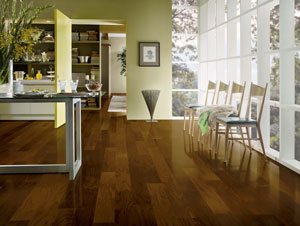 Today’s hardwood product mix offers greater options for buyers beyond traditional oak strip and foreign exotics. With technological advances and a growing concern for the planet’s ecological balance, consumers can find floors that are locally produced and environmentally responsible via domestic exotics.
Today’s hardwood product mix offers greater options for buyers beyond traditional oak strip and foreign exotics. With technological advances and a growing concern for the planet’s ecological balance, consumers can find floors that are locally produced and environmentally responsible via domestic exotics.
Though the term sounds like an oxymoron, domestic exotics are generally considered to be any species of wood harvested in North America that is not oak. Traditionally a favorite among consumers, today’s discerning buyer has greater options for her flooring, whether her needs are visual, performance or green driven. Species indigenous to our continent like ash, walnut, cherry, maple, hickory/pecan and birch can meet those needs.
“In the industry, [these species] are commonly referred to as domestic exotics because they aren’t the norm for wood flooring,” said Brian Greenwell, vice president of Mullican Flooring.
While unique colors and contrasting grain variations are a major draw for purchasing domestic exotics, they can still deliver performance. The janka rating for domestic species varies anywhere between 900 and 1800, a far cry from Brazilian species of hardwood that top out at 3680. “Cherry and walnut are both considered soft hardwoods but they are favored by consumers for their rich and distinctive colors,” Greenwell said.
However, the inherent hardness of the specie is no longer the deciding factor of durability, thanks to today’s latest advancements in manufacturing  technology. “The type of cut—plain sawn vs. quarter sawn—and the finish used are key to durability,” said Ed Korczak, executive director and CEO of the National Wood Flooring Association (NWFA).
technology. “The type of cut—plain sawn vs. quarter sawn—and the finish used are key to durability,” said Ed Korczak, executive director and CEO of the National Wood Flooring Association (NWFA).
John Woolsey, vice president of marketing, Anderson Hardwood Floors, believes North American hardwood flooring manufacturers simply make a better, more consistent, quality product. “Off-shore products have been around for quite some time but, to my knowledge, no Asian or southern hemisphere product has been recognized by independent retailer research for its quality.”
Buyers are finding these advantages worthy of their buying power. “The latest data points to increased demand for domestic exotics expanding as tropical exotics have decreased due to the Lacey Act,” explained Dewevai Buchanan, vice president, hardwood, for the Unilin division of Mohawk.
With reports from the NWFA pegging foreign exotic imports at a decrease of 20%, domestics have picked up almost that exact number in market share. Armstrong estimates 20% of 2009’s hardwood sales came from domestic exotics, equating to a market size of 140 million square feet and growing, according to Shiva Menon, product manager, Armstrong hardwood.
“Because of the weakened national economy, we have noticed that domestic exotics such as hickory and maple have become more popular, while foreign exotics are currently less in demand,” Greenwell observed. He credits this to the idea that exotic flooring is considered a luxury item and consumers are choosing economical, practical alternatives.
Green thinking
Growing concern for the responsible sourcing of lumber is no longer just a social commitment. It is a legal obligation punishable by hefty fines, thanks to the latest revision of the Lacey Act in 2008. According to the law, any plant taken, harvested, possessed, transported, sold or exported, particularly in the form of furniture, paper or lumber from anywhere in the U.S. or abroad without proper declaration is subject to seizure and the possessor can pay fines up to $500,000. For example, if a company in California imports a shipment of wood flooring from country X, made from timber harvested without proper permits in country Y, the importer is in default. Mislabeling is also considered an offense and punishable by fines and seizure.
When it comes to choosing to stock foreign vs. domestic products, Woolsey raised several questions that should cross the retailer’s mind. “Where did the timber originate? Was it really legally harvested? Were the chemicals used in its manufacture safe? Who really made it? The answer to any of these questions could cost the retailer a lot of money down the road.”
The new regulations are such that everyone in the hardwood industry is taking notice. While all manufacturers follow the necessary measures to comply with the act, enforcement is a concern. “The current act requires the company receiving the wood to perform “due diligence,” to research the source of the wood but does not go on to explain those activities that would qualify as due diligence,” Korczak said. The organization is currently working with the Environmental Investigative Association, Forest Legality Alliance, Forest Stewardship Council, Scientific Certification Systems, Rain Forest Alliance and other environmental groups to address that issue.
-Emily Hooper
